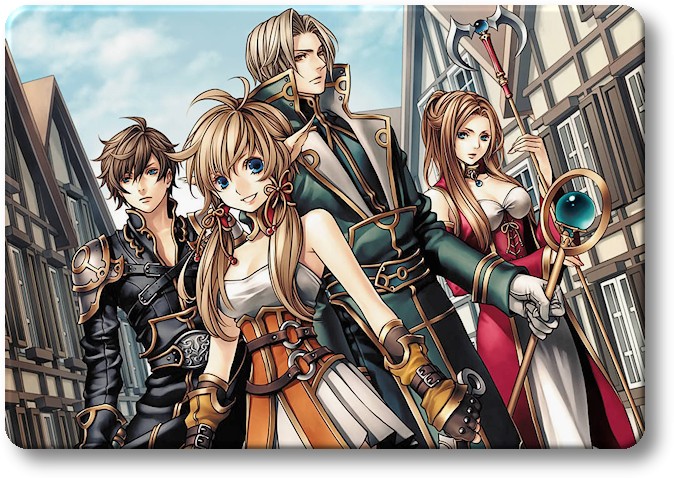
What Is An RPG ?
And What Is An RPG Maker ?
As seen through the eyes of David
Wicker © Aug 2013
(Please do not reprint
without permission)
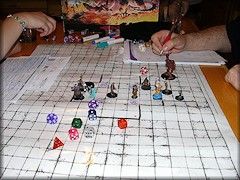
So
to begin with, very briefly "RPG" stands for
"Role-Playing Game."
The computer version is not to be mistaken
with the one that uses paper and dice from
yesteryear, though is still immensely popular
today. Although its origin stems from pencil and
paper with dice, they are now quite a unique race
of intellectual pursuit.
The PERSONAL COMPUTER today is a very lean
and fine tuned machine unlike the cumbersome and
bulky ones from yesteryear. Entertaining notions
of writing RPGs and their Generators for computers
has been well out of reach for more then several
dozen years.
Dungeonmasters, or DMs as they are
referred to, would lead a party of adventurers
into an imaginary land comprise of dragons,
fairies, damsels in dis-dress (my favorite!) *emo* ,
and they were fed and encumbered with complex
strategies, armor class calculations, damage,
experience, wisdom, intelligence.
Each of these attributes were given a
value generally no lower then 9 and not higher
then 18. Dungeons and Dragons is the one that
started it all.
Perhaps it was Myth and Monsters by
another team, but the concept in itself to have
spanned as far and wide as it had is indeed
contributed to the very many long and hard hours
Dungeon Masters went to write on graph paper, make
decision rolls based on the curve of the quest.
These adventures were entered by the
creative minds of the DM, with dice, paper, and
pencil. And so it has been for many years until
the computer was founded.
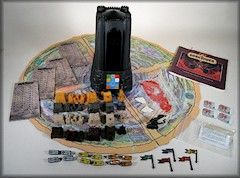
Perhaps the first RPG or serious assisting
program to a RPG was Dark Tower.
It came not just with paper, and pieces but an
electronic device, the tower itself that displayed
LED lights, back-lit inserted cards, and played
simple musical notes signifying the game's
progress.
It was not a true Computer RPG in that it
required external interface such as pieces and
keeping track of cards and pegs and the like. But
it was a start.
A start to a very long and amazing journey
that we see in today's modern RPGs.
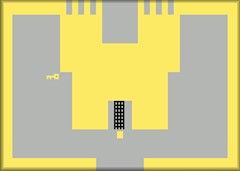
The Atari 400 was born and with it came
perhaps the very best RPG for its time period
called Adventure. Everything was represented in
big blocky images but the fun in Adventure was the
ability to explore multiple rooms.
And in using strange devices to assist
you such as a Magnet, Portable Bridge, Sword, 3
different keys to open gates to colored castles,
and the object of the game, to return the glowing
Chalice to the Yellow Castle.
Hindering the player were fearsome hungry
Dragons in poorly rendered pixels and an annoying
little Bat that liked to swap items with you when
you were in its presence.
Here's the thing though. It was not until
a good =3= years later someone found a secret, in
playing the hardest level, an invisible object was
found. Carrying it and making sure not to drop it,
you could cross over to the far left or right in
what normally was a solid wall.
There was revealed in crude rough letters
in this secret room, the original author of the
now outdated Adventure game. It was so enchanting
to find this ! A RPG Game that took maybe not a
mere 15 minutes to play but several hours and a
well-hidden secret in it to boot found only years
later !
RPGs were well on their way to winning the
hearts of the intellectual.
When the Apple ][+ came out, aside from
the all-text-only adventure games by Scott Adams
which were very popular and those that merged
text-only with crude vector graphics by
Penguinsoft, Richard Garriott introduced to us
Ultima I.
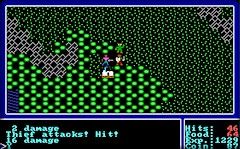
The game was huge, enormous, it took
several DAYS to play. After this came a large
collection of Ultima wanna-be's and other creative
RPGs. No longer were games crude and hand-drawn
like early releases from Bill Budge like High
Noon.
No, cleaner-carefully-thought-out graphics
were drawn. The Apple ][+ was capable of very bare
color and it was exploited to its full extent.
The only RPG I can remember that was true
and lasted several years was the world reknowned
Final Fantasy for the 8-bit Nintendo. Do you remember
this system ?
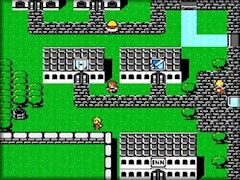
This game took not mere hours or weeks to
play but months ! Long months of playing time, and
it was in very high demand and this game ALONE
paved the way to almost every single RPG we see
today.
Ultima was interesting but it was more
tactical like the military and strategy games and
did not have the human interaction, humor, and
story-line like Final Fantasy provided.
Squaresoft, the author of this very first and
master RPG would become known in the future as the
greatest RPG company of all time and rightly so
deserved.
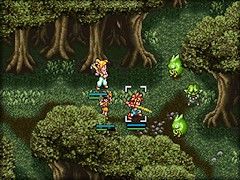
Not so many years ago when the Super
Nintendo came out, Squaresoft released to the
U.S., Final Fantasy Mystic Quest, Final Fantasy 2 & 3,
Chrono Trigger, Secret of Mana, Secret of
Evermore, and several others.
Then it was time for the Playstation
videogame console to come out and it was in very
bad condition trying to compete against its leaner
and smarter cousin, the Sega Saturn.
But Squaresoft dipped their hand in
respect and provided the greatest RPG the world
had ever known and even today is considered a
massive and monumental achievement. Most Japanese
companies it seems always holds back stock to
their foreign countries, and to us, they were no
different.
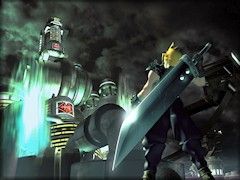
It is through Final Fantasy 7 alone that
MORE Playstation consoles were purchased. And
Squaresoft, already an EXTREME leader and
contender in the RPG field, did not charge
hundreds of dollars WHICH some Americans
(including myself) would have GLADLY paid seeing
the scope of this game.
No, it was a mere $50. This signaled the
end to the Sega Saturn, and the rebirth of the
most fortunate and lucky Playstation videogame
console which surely would have to yield to its
more powerful and graphical contender, the Sega Saturn which today is all but
extinct.
What we called FF2 was to them FF5. We
never saw the true FF2, FF4, and FF6 until
emulators were released for other computer
systems. It was with these emulators that you
could 'emulate' other game systems. The Japanese
market ACTUALLY believed we thought RPGs were
boring and uninteresting.
A business decision they may yet regret
for the rest of their financial and commercial
lives.
Final Fantasy 7 was released for the Sony
Playstation. Perhaps Squaresoft's greatest
achievement to date. Greatest achievement that any
videogame company would have liked to held the
title for.
Over $100,000 dollars in sales were
made =2= weeks BEFORE it was even on the shelf.
That was in pre-sales alone !
It was that good. And yes, it is. The game
boasted full 3-dimensional real-time 64 million
color graphics, an amazing soundtrack of over 128
original beautiful compositions, draw-dropping
special effects.
And super-computer generated backgrounds
of the most exquisite and beautiful artwork to set
the terrain and maps for the game. Claiming over
8-10 months of game play alone ! It was the most
incredible game anyone had ever seen.
Now me, like several others enjoyed this
game, but we hungered for more. And only after a
long-period of playing several hundred RPGs which
both BBSs and the internet have been kind enough
to provide almost completely for free now, do we
enter a new mode of thinking, a new desire.
Many programmers and beginning programmers
were most interested in making their own custom
RPGs at this time, and so several had. But some
people, like me, wanted something deeper then
this. Much deeper. Something much more flexible
and a very all-consuming passion, obsession, and
interest.
A RPG Generator.

Reading word for word when I did personal
research on the internet into this mother of all
projects I came across the following words:
"Be warned! This is perhaps the most
ambitious project to date next to writing an
entire complete operating system for a
computer!"
This warning didn't stop me though, it
only spurned me on as did the extreme LACK of any
RPGMakers existing anywhere in the world prior to this time
period. I thought I had something unique and
original.
Sure there were some RPG Generators years
ago like for the Commodore Amiga, but not one that
you would become so comfortable in that it was
like an entire unique world you could immerse
yourself into on a daily basis as its own personal
and benevolent overseer.
A GOD to your world, with you at the helm
to design every single facet of your universe in
it. That's quite a feeling when you get down to
it. And then have the unique opportunity of
SHARING your personal universe with others to play
in, comment, criticize on and - you know it - to
look forward to future creations you might make.
Most RPG Generators, the decent ones, are
well-aware that building WORLDs with their systems
takes many times more then a YEAR or so to do with
these systems, so they have made them very clean
efficient Engines to shorten this time period.
Added: RPG Makers today have made immensely complex strides towards simplifying the world
building and game building process.
ASCII, perhaps the leader in
game-builders, not just RPGMakers, but
Fighter-Makers, Shooter-Makers, and
Platform-Makers.
ASCII I believe pioneered the way for enterprising
young RPG Generators of Engines like myself and
others.
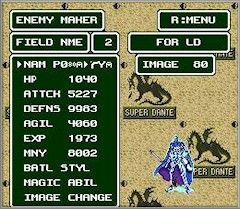
Unfortunately, ASCII sued Kanjihack more
then a year ago for translating their complete
100% Japanese Dante RPGMaker and Super Dante RPGMaker 2
almost 80% into English. Their words, "Our
programs were never designed or intended to be seen or
used in the American marketplace."
Words they would learn to truly regret.
Added: We now know this to be the opposite and they are
actively merchandising their wares and RPG Makers
to us, the American Audience over the Internet.
Okay, we won't go there. :) But with the
translation of systems, the fine work of Don
Miguel translating most of ASCII's foreign
RPGMakers 100% into English, many systems spanning
greater then 7 megabytes a download, are we
introduced to some crude and mechanical ways of
building a decent RPG Generator for now and in the
future.
Many others like myself, however, quietly
squirreled away, collecting, learning, assessing,
testing, and composing bits and pieces, chunks and
fragments of own custom RPG Maker and Generator
code.
Some have released their creations and are
well-renowned today such as Verge, OhRRRPGCE, and
a few others. There is not too much
competition in the world of building RPG
Generators because of the complexity and scope
involved.
Added: We now know this to be the opposite and there are
MANY RPG Makers out there on the Internet.
A decent RPG Generator in my opinion would
have to have in it a few requisites:
+ Music & Emotions

at least more then 60 musical compositions
to set mood for: Happiness, Anger,
Contentment, Frustration, Loss,
Bewilderment, Humor, Love, Compassion, and more.
And of course the ever-popular Adventure and
combat themes to get you into the mood.
+ Graphics & Craftsmanship
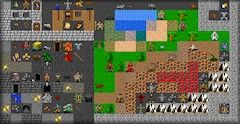
most RPG Generators are tile-based
to conserve memory. That is the MAPS and
WORLDS are comprised of several hundred unique
individual tiles that link together in much the
same way LEGOs would to form larger and greater
structures.
Today we are very shrewd and unforgiving
to new entries into the RPG world and demand they
use and have the very best graphics and
capabilities or it is only 2nd best to Squaresoft.
+ Cinemography & Cut-Scenes
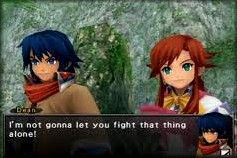
This WAS absent from most of the newest
entries into the world of RPG Generators, and with
good reason.
At the time it was EXTREMELY difficult to
program a system that acting upon certain
flags, categories, talismans, events, and scope
into a said custom-designed universe AND also
provide hidden bonuses like image panels that
moved the story along.
For this universe had to have the
capability of changing the game's tempo, at an
almost emotional level, the music, the theme, and
allow entry and unique animations of several
hundred sprites acting entirely upon a unique
user-definable program.
To put into them and behaving - if I dare
use the word, like a HUMAN would. Yielding the
envelope of COMPASSION for the other
computer-driven characters they meet in this
unique world. ANGER towards the said bad-guys and
villains in the series who almost always manage to
get the goods before you do.
Squaresoft has done an INCREDIBLE job of
keeping this very vital attribute in all of their
creations.
For example, you touch a person somewhere,
the music fades to a new emotion, text appears on
the screen mentioning what the character you are
talking to is saying, more people pour into your
field of view, they introduce themselves as
friends of whom you just conversed with.
Then they swap several items with you and
set multiple invisible flags for the upcoming
changes in the story.
Perhaps a few new players may now join you
in your adventure, and it is your responsibility
now for their well-being in the game you are
playing, the quest is accomplished that one more
1% through more then a ten minute cinemagraphic
RPG story.
This is a difficult thing to put in a RPG
Generator but in my opinion absolutely VITAL. For
without this human interaction, without this
sorrow that a player sheds REAL tears over the
loss of one of their close friends as played in a
carefully thought-out loss scene, then the system
is mechanical, robotic, and tactical. And it has no real soul.
Today any RPG that
has no soul has a very short lifespan indeed
irregardless of its fine or superior graphics and/or music. It must
have a SOUL or it becomes predictable, boring, and
uninteresting.
+ Animation & Emotional
Expression
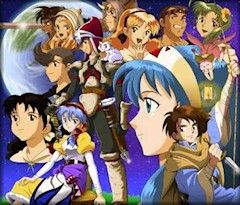
Most RPGs and RPG Generators allow the
usual of 8 sprites per unique image of a person in
the game. Squaresoft goes a few steps beyond this
with head tilts to represent concern, eyes wide
open comically to represent surprise, and a fallen
form of them to represent a moment of weakness or
defeat.
It is not just
Squaresoft that makes these games. There are a
large number of contenders out there who have made
RPGs, but ONLY ASCII and a few programmers such as
myself hack away at building a unique
build-your-own-world system and interface.
Added: Today expression
in RPG is done often will full cinematic scenes
complete with voice-overs from actors portraying
the characters in question to deeply immerse the
player into the plot and game.
+
Special Effects & The "Thrill Of The Hunt"
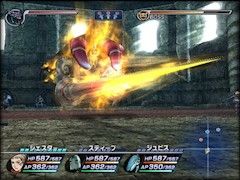
Combat in most
RPGs is frantic, funny, and frenzied, if it's done
right and well. It occurs about every 1 minute of
game play when exploring outside or in dangerous
territories like dungeons and catacombs. They are
called Encounters.
If it's NOT
done well and happens too often, then it can pull
the player away from the actual game and yields
them to thoughts of boredom, frustration and
inability to either want or need to continue
playing, defeating the purpose of the game.
Special
effects in combat are the icing to the cake.
Large several
hundred color plasma explosions, ghosts of
ray-traced summoned spirits and
elemental-types, mind-boggling creative binding
graphics that rival the best kaleidoscope that are
never boring will always WOW the player are an
important part of any good RPG or RPG Generator.
+ Growth
& Maturity
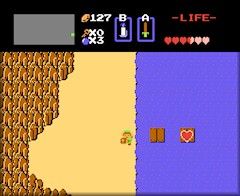
Legend of
Zelda for the Nintendo is a good example
of a game that does NOT do this. This unusual
RPG requires the player to FIND their growth. In
this case, graphic images of HEARTS so they can have
more Hit Points, the life points of a player or many
players in a RPG.
Most RPGs and
RPG Generators
make use of a different sort of creature. A
curious variable called Experience Points, which
are granted and gained to all the active
players in a combat party upon successfully defeating
their said determined or random encounter
opponent.
It is through
experience
points that a player is raised to a NEW LEVEL, with greater
strengths, defense, cunning, and other marked
abilities.
Experience
Points if done WELL in a system
gives the HUMAN player a feeling of growth
themselves, of maturing in a game and of becoming
wiser and smarter and bolder to exploring deeper
and more dangerous territories in the game and
finding greater treasures.
A
well-designed system makes it harder with a larger number
to get to even higher and higher levels.
Naturally the more difficult the random encounters
are in combat, the more experience points are to
be gained.
+ Replay
Ability & Interest
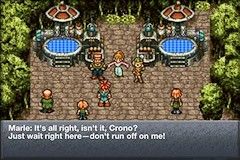
Ever gone to
see a movie that had good
reviews and, after seeing it, you agreed
it was a good
movie, BUT you would not want to see it again ?
What was missing. What elements could they
have added or removed that would make you want to
see it again ?
Chrono Trigger
RPG (seen above) is a great example of Replay
Ability. Once you win the game you are given the
option to play it again from the beginning WITH
all the weapons, armor, spells, and abilities you
had !
This opens an
excellent opportunity to explore the game deeply
now and to see once again the great story unfold,
but this time with no fear of losing your player
to combat as your team will be considerably
stronger than the initial monsters you encounter.
A great gift
to be sure, this replay ability that Chrono
Trigger offered to the player upon winning the
game.
Also Chrono
Trigger created a secret room that would only
appear once you won the game. It went further. If
you won the game prematurely, based upon where you
were you in meeting the other characters, would
see a unique alternative ending based upon the
"miraculous" growth of your player.
There were in
fact =13= endings in all ! You could play the game
from the beginning to end and see a possible 13
outcomes !
This is a very
rare
attribute in programs years ago and is becoming a demanded
item for today.
Critical reviewers of RPGs which
tell the story to game players around the
world are ruthless and cutting, just the way most
video gamers like them to be, and will mention
every single flaw a videogame has in it to
detract the consumer.
They do not do this
deliberately to be mean. We live in a world now
where what was a minute a year ago today is now
considered a second. We demand the very best in
anything and replay ability in a game you purchase
for a challenging entertainment must be amongst them.
Movie makers
would like to make a movie that has
re-watch value because the consumer will NOT ONLY go
out to see it again with their friends but
may go out to a store to purchase it as well so
they can enjoy it on their own.
And if the
producer has produced an exceptional product, then
individuals may even recommend OTHERS to go buy
and enjoy it themselves as well. That's marketing
that goes beyond the printed page and sheets of
advertising.
It is a rare
ability and item for a video-game to have any
really good replay value but in today's times is
being assessed as one of the most sought after and
valuable characteristics in a game.
Can you think
of a video-game you've played all the way through
recently and THEN want to play it again later ?
That's re-play ability.
A game that
has zero replay value will either be rented for
a short while and returned, or have enough
bad reviews written about it that it detracts
would-be game players to it.
It DOESN'T
MATTER how great or good the graphics, music,
animation, or ANYTHING else in it are if it lacks
re-play ability. This is needed, desired, and
demanded upon by gamers today.
+
Manipulation and Change
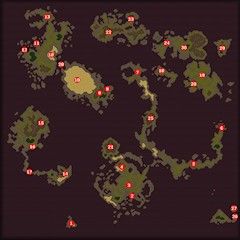
A RPG or
RPGMaker would not be so
very interesting or desirable to keep if the elements
stayed the same throughout the entire course of
it's production. Final Fantasy 3 (in Japan, Final
Fantasy 6) from Squaresoft is
a good example of change.
First know this
game takes a good 3-4 months to play and, of
course, SAVING your game so you can play tomorrow is
very vital. But then at that point, here is an
example of outstanding change in a game that will
bring the player back for more.
In Final
Fantasy 3, Kefka, an evil dictator is seeking out
the Espers, a magical race of beings, to usurp
power and control the world. Halfway into the game
enormous special-effects and story are
introduced.
The entire
planet they have been playing on since the
beginning now cracks wide open from Kefka's
meddling, images of hundreds
of lives being lost are seen in full cinema
animation done entirely by animating small sprites and
people, shaking the screen, and the movement of tiles.
Known maps
that the player has memorized over months
in playing the system are reformed and
restructured. Favorite party members in the quest
are lost, irrevocably, so it seems. Flash, Fire,
and Thunder rain down upon the earth, people
scream, dramatic music plays, and the screen fades
to serious blackness.
The screen
then shows a 3-Dimensional view of the top of the world
and its new map. The sound of seagulls are heard
and the camera pans down to a
small remote island where we find Celes.
Celes, is one
of the main characters in the game and she finds herself
on a small beach. Locke, her true love is not
with her. She examines the new location she
is in and muses to herself that nothing is
important to her except being with him, she cries and
tears, all pixelated are seen in her eyes as she runs away.
She climbs to
the top of a peak, the screen fades
to a lovely violet/blue hue, the music is hushed for a moment. And then it changes
to a heart-throbbing beautiful composition
with strings and synthesizers. She jumps ... !
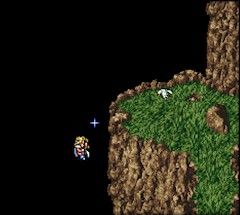
Now, if this
game has done well so far, and if the game has
REALLY hooked the player, then the ACTUAL
real-live person playing the RPG game will be MOVED to
real TEARS and cry as she commits this very
emotional and distraught act of suicide for -
LOST LOVE.
As she falls,
the music cascades into a crystal of emotion,
and the screen fades to
black lingering on the last beautiful and delicate
digital notes
with very tiny sparkling crystals coming from her eyes
to represent her tears of extreme sorrow as she
falls - to oblivion.
Transition and
change again, she is only slightly injured
having fallen on some soft sand. Fate must have
other plans for her and she finds Locke's scarf
a small dove is carrying on the beach.
With new resolve and
new commitment she now seeks to find him and
continue on in this massive quest, despite the
world being changed and all her friends lost. Any and all
transportation such as boats and
Airships to cross mighty distances have been lost.
The player is
essentially 'penalized' for having come this far,
but if the game has done a good job, and yes it
has to this point, then the player feels refreshed
and up to the challenge of traveling the new world
on FOOT if need be, as if in the beginning of the
game.
Back to Celes,
she has fashioned a crude raft from timbers on the beach and
sets out the open ocean completely alone by herself
and seeks to recover and locate her lost 8 friends who
are major characters in the game.
=IF= this game
has entranced and captured the HUMAN LIVE
player correctly, a mental and physical RUSH of
adrenalin will be felt shivering them, and making
them more HUNGRY and EAGER then ever before to see
how the story turns out.
A story that they
have complete control over themselves.
If a game is
not capable of change, it becomes stagnant,
predictable and uninteresting. Squaresoft
introduced the most mighty of changes for
Final Fantasy 3 by presenting an entire NEW
WORLD in the middle of the game forcing the
player to rethink strategies and to place new
goals and new destinations in mind with
them.
+ New Category
(sub-quests)
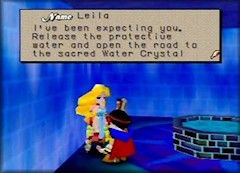
This is being added. I have noticed that sub-quests are
vitally important in RPGs as well. That is,
you are permitted to stray from the fixed path
and go do adventures that are not necessary to
winning or accomplishing goals and may in fact
be considerably difficult or challenging.
And yet - if it's done correctly,
the player is rewarded with higher weapons,
armor, spells, and talismans that they would
normally not find if they stayed on the path
to accomplishing the original goal.
Final Fantasy 1 (Origins) for
instance is a good example of this. Despite
having beaten the boss of the castle and you
have traveled onto other things, you are made
aware of in a quick cut-scene that a door you
saw very early in the game that was once
locked is now open.
You go to investigate, clearly
against the grain of the path of the game
going backwards in your progression and find
enchanting new and somewhat silly quests to
perform. A whole host of sub-quests awaiting
the player.
Because you took the time out to
explore this unnecessary path, the player is
challenged with exceedingly difficult
monsters, mazes, and brainy puzzles, but is
also rewarded with exceptional treasures and
prizes that can't be found anywhere else in
the game.
This then is the importance of
sub-quests, and I believe they are valid and
vital for any RPG, especially for those
players who like to explore every facet of a
game.
+ The
Anime Principle & The Cutesie Factor
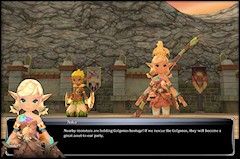
It is not
until recently
(2002) has Anime, a unique type of cartoon that
comes from
Japan that has artwork of BIG round
faces with BIG eyes, little bodies, and in almost
all ways are insufferably cute and adorable.
This is
getting to be a vital attribute for RPGs and RPG
Generators. There is a very strong link between
watching a Japanese Animation saga and playing a
RPG.
It is not too
surprising to
find that most people who enjoy playing a RPG also enjoy
immersing themselves into a rich and wonderful
world that is presented in well-thought and
and animated Japanese Anime.
To assist RPGs
in this development, full-drawn faces to each
of the important characters in the game are
presented both in communicating with others
and in viewing their vital statistics.
A RPG is much
more interesting and believable to play when you
can actually see your character and associate a
fondness and familiarity with them by seeing
their likeness.
Keeping tempo
with
all RPGs, most heroes and heroines are dazzlingly beautiful,
severely innocent and naive in early stages of the
RPG, and quite easy to become fond of for their
list of misfortunes and bad luck.
I fully
believe RPGs are more desired when the art and
character sketches included are more along the
lines of teen Anime rather than dramatic and
serious persona and avatars.
+ Reward
Factor & Collectible Tokens
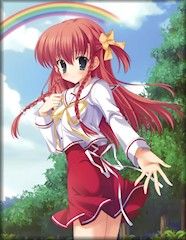
Very few RPGs
would be expressed with interest
if there was not a reward factor involved.
This then is the game rewarding the player
through uncalled and above-board ingenuity in solving
puzzles that very few people may understand or
recognize in the course of the RPG.
The grand and
glorious ending that MUST be in the RPG. I mean
let's see now, over 8 months of playing a RPG
you don't JUST want to see the text YOU WIN, GAME
OVER, PLAY AGAIN ?
Nooo ! ... You
wanna
see ALL the important characters that you met and have
literally gained a friendship and tangible
attachment to. You want to see them all in their
completed lives. You want to see an ending to a
RPG that may go as long as a half hour or more
playing incredible adrenalin-driven music.
Add to that BRIGHT and
beaming faces of the literal THOUSANDS of people you
had met in the game, and a sense of EXTREME
satisfaction in having surmounted these incredible
odds, these difficult journeys, these unbelievable
escapades.
You want your
player to cry REAL tears of JOY because the
HUMAN player is so HAPPY to have done so much in
this game to help and assist others over a period
of TRUE 3-4 months of playing.
You want to
travel the world at the speed of sound and see
hundreds of people waving at you, read long
messages on the screen as each famous character
interacts with each other in a complex
Cinematographic script for the very last time, each with
their own dreams, ambitions, and desires known
fully now to the human player, YOU.
You want to
see all these things, a shimmering thousand
rainbow crystals, two lovers reunited, kingdoms
rebuilt, families found, and purposes attained once
again. These then are the REWARDS that a RPG
player will go to see and DEMAND to see in the most
awe-inspiring and cataclysmically complex game
type ever, the RPG.
Most recent
additions to REWARD concepts in RPG is the
introduction of tapestries and pictures that the
player can WIN only through extremely difficult
measures and carry around which is very well-drawn
artwork of any of their player characters.
Usually they
are of an enticing and
provocative nature for a female, and heroic and
gallant
rigidity for the heroes, still maintaining cute
features above all. It's a pretty new concept but
one of which I plan to include in my own RPG
system.
This then is
the world of RPGs and RPGMakers. This then is
perhaps the most intelligent and consuming
of all
videogame types that are out today. Sure, we all enjoy a
good 3D Racer, maybe like to jump on the heads of
critters in a cute platform game.
But have you
noticed recently that most of these predictable
games are introducing RPG elements into them now ?
With the multiple facial expressions of our heroes and
heroines in these shooters, platforms, and
racers, slight RPG elements are seen such as verbal
interaction with the player's competitors.
"Trophies"
such as seeing their opponent
defeated after a quick game and having a nice small if
not outstanding ending are starting to be more and
more added to these smaller games.
But never
forget, nothing, absolutely nothing comes close to
the complexity that spans beyond chess,
the compassion that spans beyond the best romance
novel, and the involvement of a player in the
unique world of a RPG.
Nothing goes
beyond this save the very under-estimated and
mighty RPG Game.
AFTERWORD

Today ? RPGs
are one very hot item and of extreme interest to
millions of players, especially with the advent of
super-computers and game machines like the PS3
that are capable of MILLIONS of 3-dimensional
polygons now.
And the
stories are that much more complex, the gameplay
is that much deeper, and the plots are that much
richer and detailed.
RPGs are
definitely for those people that enjoy complex
scenarios, and
feed off of the difficult and seemingly
impossible odds placed against them in the game.
These games
are so consuming that even at 4 hours a day 7 days a
week in playing them, perhaps only several months
later even up to a YEAR would you see the grand
and glorious
ending to a single one of these modern RPG games.
The reward
factor is high
and it must be. After ever single combat or small puzzle
solved a very catchy RIFF of music may be heard, new
locks may be opened, and new paths may be explored.
We players are
a demanding bunch of people now holding zero
pity for any games made today that are not in every
way excellent, flawless, and outstanding in
every possible facet of its creation and
existence.
RPGs are
necessary I believe because they allow you and
others, if even just for a moment to leave your own life and
help and assist these other incredible,
naive computer-driven characters and possibly
other Online players into their world
from their first humble beginnings to their final
climactic endings.
From the time
RPGs were many years ago to the paper, dice, and
hand-drawn charts on graph paper to the Dungeon
Master, so now do we yield to a greater and more complex
form of entertainment.
No longer
restricted by
the limitations of memory and inability of
poor computers. Creativity and raw brilliance and
intelligence can be seen and highlighted on
today's most
modern of computers. With these computers of today, the
awesome and mighty power of the average personal PC
computer spans gigabytes of storage and boasting
several hundred megahertz of speed (update - gigahertz).
So now, and
beyond this momentous year 2000 can large companies and
individuals like you and me consider this most
amazing and difficult journey of all, to build your own
custom RPG from generators and engines designed to
listen to you and your dreams.
It is a system
that is capable of building huge world files, and
yes, it is an ambitious project and perhaps one of
the most difficult challenging programming tasks
to date for a programmer to build such an engine.
Yet I know
from experience it is a unique and humbling
feeling to have people build worlds in a system
you personally created for their enjoyment and
amusement.
It's a curious
sensation to see massive games, to see world
creations built lovingly from the ground up,
thousands of hours later to express intimate and
amazing stories all their own.
If you are up to
the challenge, let it continue with you ...


























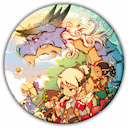

 Flag Writing
Flag Writing